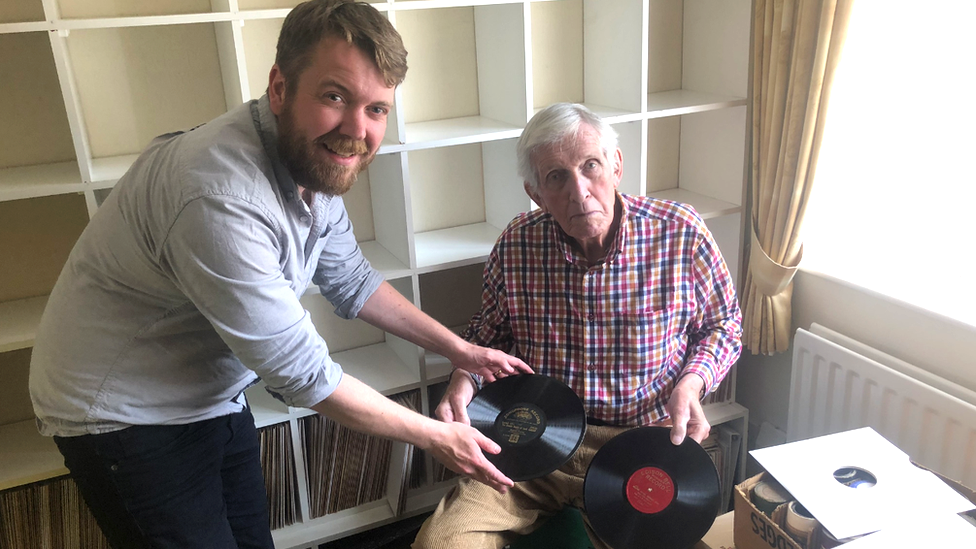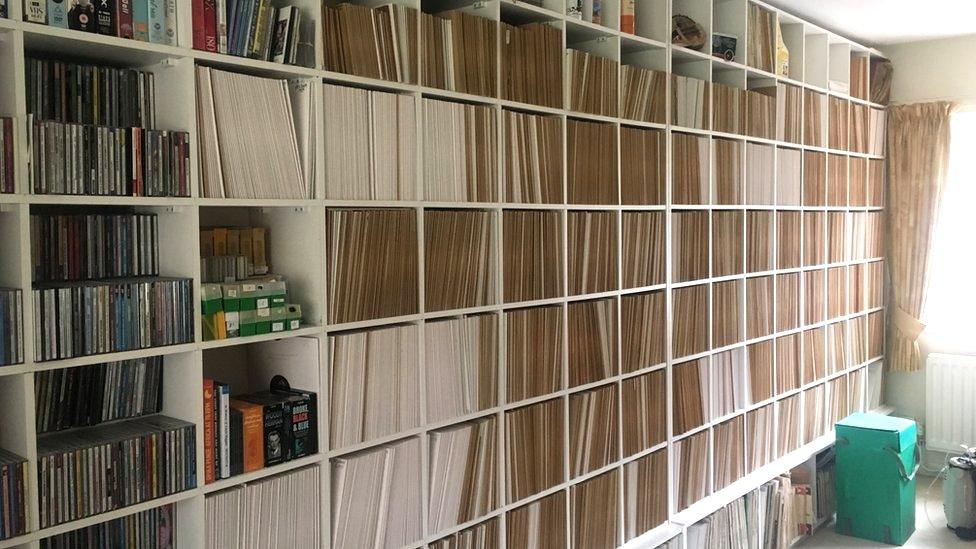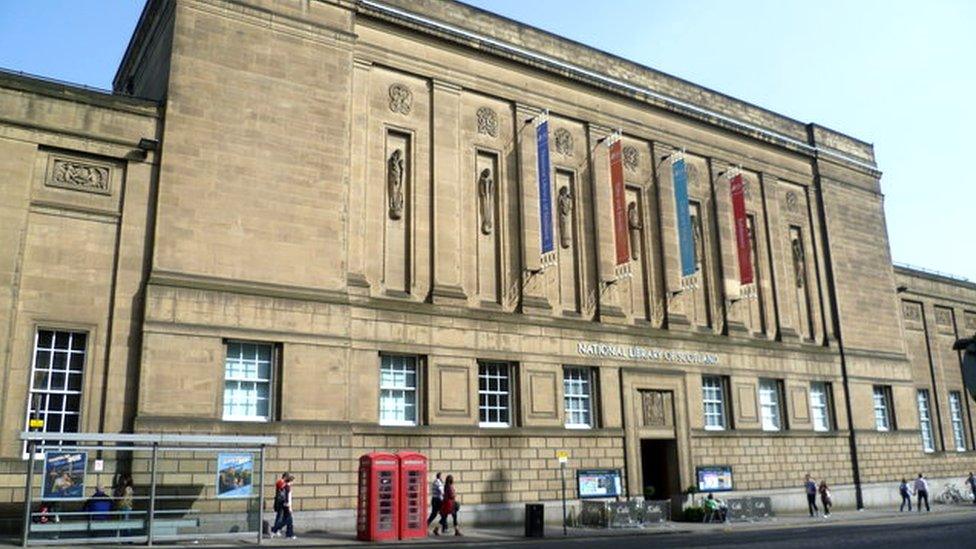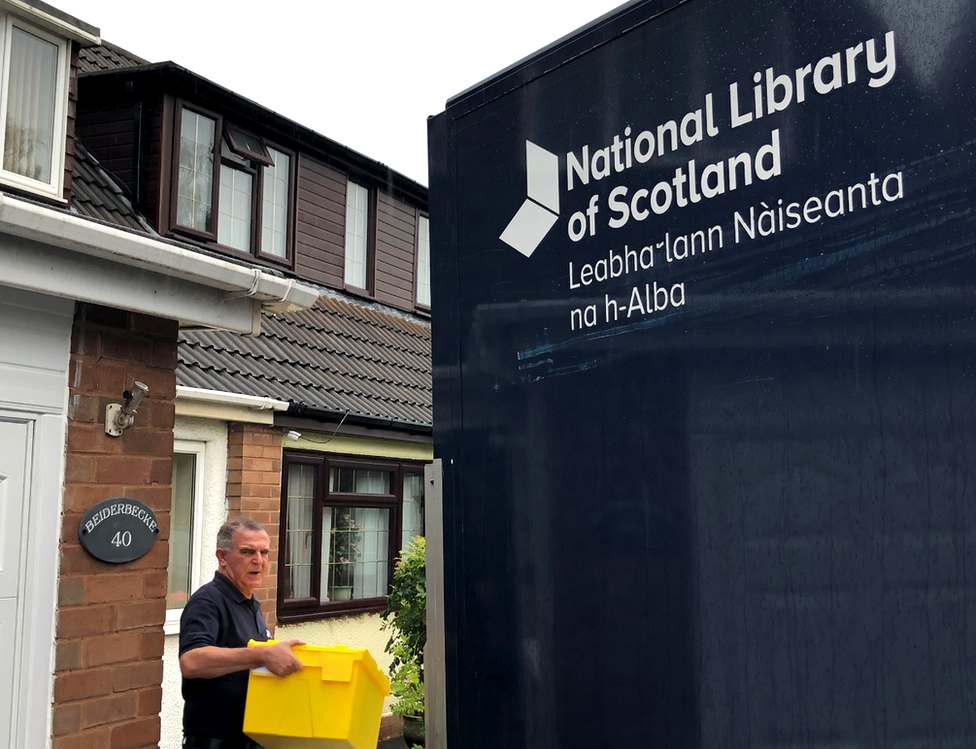Building a national Scottish sound archive
- Published

Bill is handing over his collection after spending 70 years building it up
Bill Dean-Myatt was 12 when he bought his first record in 1948. It was the Woody Woodpecker Song by Danny Kaye and the Andrews Sisters.
"I haven't got that any longer," he admits.
A cousin persuaded him at 13 to listen to something a little more cool, and he acquired his second "78" record, by jazz musician Bix Beiderbecke. That one, he did keep. The cover is framed and on the wall of his home on the outskirts of Birmingham.
In the 70 years which followed, Bill amassed a huge collection of recordings - many of them Scottish and 12,000 of which are now in the archives of the National Library of Scotland.
While jazz recordings were meticulously documented, he was concerned the music he'd grown up with thanks to his Scottish grandmother - music hall, folk songs, pipe tunes and Gaelic songs - were being forgotten.
Music hall
"It struck me, we knew all about American jazz and blues, country, classical and opera but no-one knew anything about the vernacular music of England or Scotland."
He wrote to every Scottish university and received encouragement from only one academic, David Hutchison at Glasgow Caledonian University. At the age of 70, he completed not just a degree but a Scottish vernacular discography from 1888-1960.
It was at that point he offered a quarter of his 12,000 recordings to the National Library of Scotland.

Bill's home has been a treasure trove of all styles of music
It includes recordings dating back to 1898 - the first known commercial pipe record, bagpipe music and Gaelic songs, music hall numbers and spoken word. Artists include Harry Gordon, Harry Lauder, Bob Smith, Willie Kemp and Heloise Russell-Ferguson.
There are also many recordings from labels like Beltona, recording traditional music since 1923, Scottish Records from Dundee, Gaelphon in Stornoway and Waverley Records which specialised in accordion music.
He says he hopes his donation will encourage other collectors to expand his collection into a national sound archive.
Still to be found
"For every record I have, there are plenty more I don't have. Apart from Harry Lauder, Will Fyfe and Jimmy Shand, everything was sold only in Scotland, so many labels remained obscure and there's lots of material out there still to be found.
"People often dismiss early sound recordings because they're scratchy, they're not clear, they're the wrong speed or the musician is playing at the wrong tempo. Think of an archaeologist on a dig who finds a bit of broken pottery. Does he say this is a bit of coarse earthenware and throw it away? No, he uses it to date the site and build up information.
"It's no different to a record. You listen to a singer from the 1900s, it's a different style, you're listening to the history of singing."

The National Library of Scotland's sound archive contains 60,000 recordings
He says letting his collection go was emotional. Now 86, he's in ill health and is anxious for his collection to find a good home.
"Emotionally it was difficult. They're like my children, like my family. Almost every record has a story - where you found it, the person you bought it from, the way you searched for a long time and then found a copy. They're full of memories for me.
"But the worst thing I could imagine is if I pop my clogs and my two daughters come in and say, 'Oh my God what will we do with this? It's all Scottish stuff and who wants that?'
"They'd have to sell to a dealer and get £50 for the lot, or split it up, or dump it in a skip and it becomes landfill. Or I do something constructive with it. My daughters are happy for it to be preserved and my name will live on in the Dean-Myatt Collection.
"I feel it's important to Scotland to have its own national sound archive and that it collects its own vernacular music, irrespective of fashions or whether they like it or not. I hope this will form the nucleus of a national collection and generate enough interest to get other collectors to donate."

National Library staff have moved crate-loads of recordings out of Bill's house
So far, the National Library of Scotland has catalogued 3,000 of the 12,000 works and the process of cleaning and digitising is under way.
"It's a bit like a book you can't read yet," says Alastair Bell, the library's sound collections curator.
"The sound is currently locked into the format and we have to process it. Some will be available for click and play next year. Others will take longer to clear copyright and it may be that people will have to listen in the library. But eventually, we hope to digitise the entire collection and these fragile formats can go back into storage to preserve them for the future."
The National Library of Scotland holds more than 31 million items, dating back over a thousand years. The sound archive contains 60,000 recordings including the Dean-Myatt Collection.